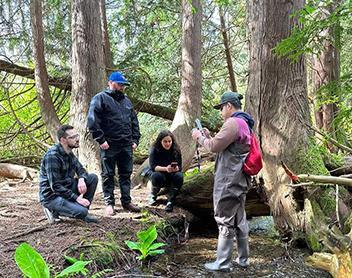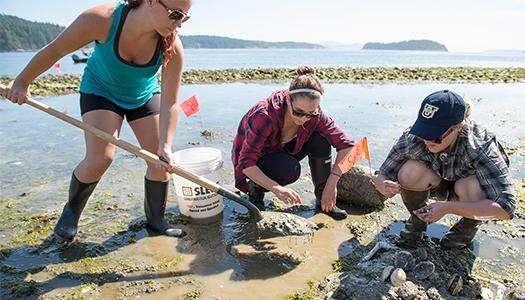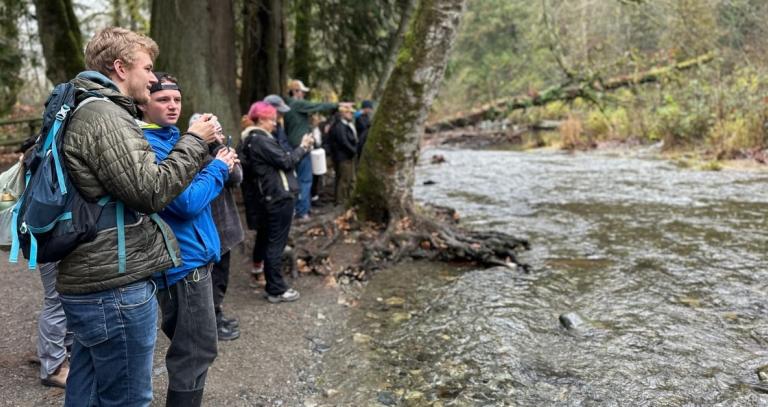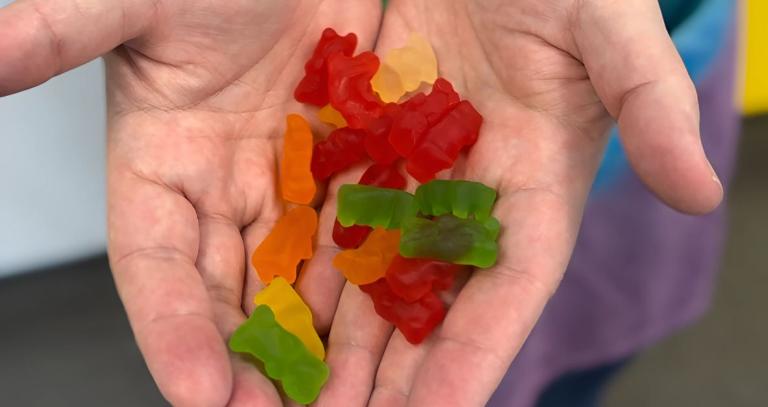Build your passion for science and the environment with basics of environmental management, economics, law, communications and sustainable development. Apply skills to a practical research project.
You want to learn about the world around you, to help it change for the better. You are passionate about science and the environment and want to put that energy to work.
Complete the last two years of your undergraduate degree in 12 months entirely on campus or in 24 months through a blend of online courses and on-campus residencies.
With environmental and scientific knowledge applied to team-based practice, you'll be well-prepared for leadership in industry, government and environmental consulting.
Upcoming offerings
Stay tuned for updates or contact us for more information.
Request more information
Program description
Build on your existing knowledge of environmental science through this team-based program, combining theory with practical laboratory and fieldwork skills.
Learn about environmental management, economics, law, communications and sustainable development.
Spend time in our on-campus, state-of-the-art laboratories, giving you experience in laboratory practice and procedures as well as the foundations of environmental science with chemistry, hydrology, ecotoxicology and ecology.
Besides the environmental science learning, you’ll cross-train with other disciplines, like social sciences and humanities. This helps you become better able to analyze and solve problems around complex environmental issues.
Hands-on research
If you're enrolled in the 12-month on-campus option, you will work on a hands-on environmental consulting project over 11 months of your program. You'll collaborate with sponsor organizations to design, budget, conduct and report on your research, giving you a suite of practical and in-demand skills.
These projects are the perfect opportunity for students entering the environmental field to graduate with relevant work experience and a project to highlight their abilities to potential employers.
→ Learn more about your study options.
Study abroad
Gain a perspective-shifting international experience while completing your studies. Study abroad at one of our partner universities in Japan or Chile.
Program outcomes
Once you have completed this program, you'll have a broad range of technical, communication, analytical and interpersonal skills, together with a firm grounding in environmental science.
These skills set you up for success in environmental consulting, environmental management for industry, business, non-governmental organizations and municipal governments, as an environmental policy advisor, mediator for stakeholder groups, or in environmental monitoring or regulatory compliance.
Study on campus or through a mix of online learning and on-campus residencies
The courses are similar in both options, so choose the one that fits best with your life and goals.
Blended, two-year option
This is a great way to help you balance work, family and school.
The blended option combines online learning with three, three-week residencies on our beautiful Colwood Campus. You'll also take two additional management/policy courses.
This is not a self-directed or self-paced option, so you'll need to manage your time to ensure homework is completed on time.
Online learning
Online courses consist of assigned readings, synchronous or asynchronous lectures, interactive discussions, and individual and team assignments.
In this program, you'll typically take one online course at a time, each for a period of approximately nine weeks. Each online course requires approximately 30 hours of work per week.
You'll start your program with a non-credit, but required course about academic integrity.
Residencies
The on-campus residencies are intensive and immersive. You'll complete the laboratory and field work parts of your courses, which are not possible at a distance. Each residency concludes with two to three days of examinations or final presentations.
Each residency is three weeks long and begins in late April or early May annually, ending on the May long weekend.
You can also expect to attend classes full time (e.g., Monday to Friday from 8:30 a.m. to 5:30 p.m.), take two or three courses at a time and attend field trips.
You can also expect to:
- have laboratory and field instruction
- do some online work for some classes
- do team meetings, homework and readings in the evenings or on the weekends
On-campus, (12-month option)
This option is ideal if you want to immerse yourself in your studies and the local environment.
You'll attend classes on our Colwood Campus five days a week, from 8:30 a.m. to 4:30 p.m. over four terms. Each term concludes with an examination week, followed by a break week.
This option contains the major project course, which is a feature that distinguishes it from the blended program.
On-campus learning
The on-campus program features a cohort-based learning environment.
You can expect:
- team-based learning, and coaching to improve team skills
- participation in an integrated social and natural science inquiry
- engagement in an innovative project, open space technology and fieldwork
- hands-on laboratory exercises and field exercises
- a student research project
Research project
This program capstone is a student-led, team-based environmental consulting project that takes place over 11 months of the 12-month program. You'll work with sponsor organizations on applied research projects, with responsibility for the research design, budgeting, ethical approval, conducting and reporting.
Pathways into the BSc in Environmental Science
You can start your journey toward a Bachelor of Science in Environmental Science in more than one way. Whether you’re coming straight from high school or already have post-secondary or work experience, there’s a pathway that fits your background and goals.

Option 1: Start with an RRU undergraduate diploma
For students coming from high school.
If you’re just beginning your university studies, start by building your foundation through the Undergraduate Diploma in Applied Environmental Sciences. The program includes hands-on learning that can lead directly into the program once you meet admissions requirements.
Option 2: Enter directly into the BScES program
For students with prior post-secondary or work experience.
If you’ve already completed university credits, a college diploma, or have relevant work experience, you may qualify to enter the program directly.
Our flexible admissions process considers your academic background, work experience, and life learning—not just your grades.
Learn more about our your admissions options or view a list of available transfer agreements.
Want to chat about your options?
Courses
Faculty
Transfer agreements
Refine results
Prerequisite(s)
At a minimum, the following recognized college/university level courses, each with a minimum 'B' (3.00/4.33) grade:
- Six credits (two courses) in chemistry with a laboratory component in at least one course.
- Six credits (two courses) in biology.
- Six credits (two courses) in math or physics (may include three credits of statistics), with at least one course in linear algebra or calculus.
- Six credits (two courses) in writing or communications.
Standard admission
- Completion of an approved transfer program with a minimum 'B' (3.00/4.33) GPA.
or
- Completion of prerequisite courses with a minimum 'B' (3.00/4.33) grade in each.
- Completion of an Arts or Science Diploma (or 60 credits), including a minimum of 24 second-year credits, with a minimum GPA of 'B' (3.00/4.33), from a recognized post-secondary institution.
Flexible admission
Applicants who do not meet the Standard Admission requirements will be considered for flexible admission and assessed as follows:
- Completion of prerequisite courses with a minimum 'B' (3.00/4.33) grade in each.
- Significant, relevant experience.
English language proficiency
- If English is not your primary language, please review our English language requirements.
Additional recommendations
The requirements listed above are the minimum requirements for the program. Before entering the program, well-prepared students typically have completed:
- Inorganic and Organic Chemistry
- Ecology and Microbiology
- Calculus and Linear Algebra
Royal Roads University recognizes that each student has unique characteristics and qualifications. Therefore, students who have questions about their eligibility for this program or wish to discuss flexible assessment options should contact the program office for more information. Contact one of our advisors to learn more about how Royal Roads can help you reach your career goals.
Application requirements
All applications to this program require submission of the following information and supporting documents before your file can be assessed for admission:
Application form
In order to apply online, you will be required to create a log-in account using your email address. You will be required to list all credit courses and/or programs you have completed or are currently enrolled in. An application fee will be required.
If your application fees are being paid by a third party, review sponsored student information. Once submitted, you may check the status of your application at any time.
Missed your application deadline? While we can’t make any guarantees, we may be able to accommodate late applications if there's still space and enough time to process. If you're interested in an intake that is now closed to applications, apply for the next available intake and email Admissions with your preferred start date. Make sure you’re prepared to submit your program's required documents right away. We can't make an admissions decision without them.
Official transcripts
Applicants are responsible for arranging for the submission of official transcripts from ALL post-secondary (higher education) institutions currently or previously attended, for all credit courses and/or programs. Transcripts are not required for non-credit programs or courses, though some programs may require proof of professional certifications or designations.
Transcripts are considered official only if submitted directly by the Registrar or other recognized authority of the providing institution in the institution's original, sealed envelope. If the envelope has been opened, the transcripts are no longer official and new (official) transcripts will be required to complete your application.
All international transcripts or credentials are subject to an international transcript and/or credential evaluation.
Additional requirements for flexible admission
For applicants who will be reviewed under the flexible admission process the following additional supporting documents will be required:
Personal statement
Your personal statement should be no less than a one-page letter indicating your motivation for seeking entrance to the program. Your statement should comment upon your personal and career goals, the expectations you have for the program in relation to the achievement of your goals, and the strengths you feel you can bring to the program. The statement must be the work of the applicant.
Letter of reference
Typically, applicants will provide one reference letter based on your work experience, academic performance, or community service that you have undertaken.
We are looking for referees to confirm that you are a suitable candidate for the Bachelor of Science in Environmental Science, i.e. that your referee feels you will succeed in such a program (and why), that they feel it will benefit you (and why), and whatever else the referee knows about you that makes you a good fit for the program. The context in which the referee has come to know you should also be mentioned.
Length and level of detail in the letter can vary; there is no set standard.
Detailed résumé
Your résumé should include the following:
- Education: List all post secondary education, degrees, diplomas, and certificates you have achieved.
- Training/professional development: List career related training and professional development programs completed within the past five years. Include the source of training, and the duration and year completed. List other training and personal development programs not already identified.
- Work experience: Please include name of organization, position, length of service and brief description of duties.
- Voluntary/unpaid work experience: List and describe any voluntary/unpaid post-secondary employment and/or community service experience. Please include the name of the organization, length of service, and a brief description of duties. List positions you have held in this service.
- Information technology training and experience: Briefly describe your level of training and experience in the use of information technology including computers, software and telecommunications networks as tools for business, education, teaching and personal use.
- Professional memberships/affiliations: List memberships and positions you hold/have held in professional associations, service clubs, community/volunteer sector.
- Other relevant information: Provide any other information which you believe is relevant to your application and will be of assistance to the review committee.
If applicable
- Applicants declaring permanent resident or Convention Refugee status in Canada, must submit a copy of their Permanent Resident Card (PR card) along with their application.
- Transcript evaluation fee or credential evaluation report, if submitting international transcripts.
- An official English language proficiency score report or other evidence of proficiency if English is not your primary language.
Other information or documents as may be requested to determine your eligibility.
For information on how and where to send your supporting documents, please refer to the document submission guidelines.
Financial aid and awards
Refine results

Get involved and start making a difference with real-word experience.
As part of the on-campus program, you are required to complete a major research project that is developed in collaboration with local institutions and organizations to research and solve regional environmental challenges. By engaging in practical undertakings, you’ll develop a comprehensive understanding of what may be expected of you upon graduation.
You will work with sponsor organizations on applied research projects and be responsible for research design, budgeting, ethical approval, conducting and reporting on the research. The skills, tools and knowledge that you will cultivate through the process will be invaluable. These projects offer the perfect opportunity to graduate with relevant work experience and highlight your abilities to organizations within the environmental field; they also provide the chance to network with peers and potential future employers.
Following are some examples of past major projects completed by the Bachelor of Science in Environmental Science students.
Healing city soils in Greater Victoria
Working with the Compost Education Centre on Healing City Soils, students from Royal Roads assessed local soil for toxic contamination to evaluate whether communities and urban gardeners could safely use it to grow their own food. More than 400 soil sites have been tested for heavy metals over the past couple of years. Soil test results from the first two phases of the project are now uploaded onto the Victoria Soil Quality interactive online map, providing community members with a picture of soil health throughout the city. Read more.
Re-establishing Indigenous shellfish at the Coburg Peninsula
A team of students worked with the City of Colwood to re-establish a clam garden in the region. After multiple visits to the Coburg Peninsula, students analyzed the area’s sediments for metal contamination at the university’s Sherman Jen Building science labs. The objective of the project was to obtain an understanding of the health of the sediments at the Peninsula and re-establish a healthy clam garden in collaboration with the local First Nations community. Read more.
Bear-Safe waste management for the District of Sooke
In conjunction with Wild Wise Sooke, a local non-profit organization, students of the BScES program researched the feasibility, costs, and effectiveness of bear-resistant waste management in the local residential areas. The aim of this major research project was to reduce the impact garbage had on the behavior and habits of the local black bear population. By improving the bear-safe measures taken by area residents, students reduced black bear euthanasia in the region and created a more harmonious relationship with the local wildlife. Read more.

